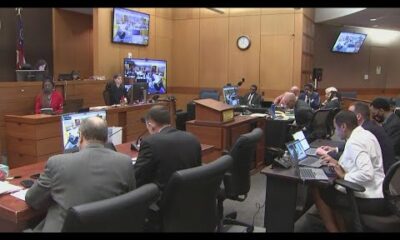Mississippi Today
Some imprisoned in Mississippi remain jailed long after parole eligibility

Transformation. Redemption. Forgiveness. Remorse.
A group of women who have served decades in Mississippi prisons use those words to describe how they have changed during incarceration and why the Parole Board should see that as evidence they can be released.
But “disheartening” is another word. They use it to describe the cycle of seeking parole. The Parole Board holds a hearing, it rejects their petitions and they have to wait years for another opportunity.
“I’ve taken accountability for my actions, sought to make reparations by living a life devoted to giving to others,” said Evelyn Smith, in a recording of her story in a campaign advocating for the release of her and four other women.
“Statistically and realistically, I pose no threat to society,” said the 80-year-old, who was most recently denied parole in 2022 and whose next hearing is in 2027. “I often ponder what is being accomplished by my continued incarceration.”
Smith is one of the Mississippi Five – women convicted of murder and sentenced to life with the possibility of parole that has never come. Collectively, they have been incarcerated for over 175 years and denied parole nearly 50 times.
The others are Loretta Pierre and Lisa Crevitt, 59; Linda Ross, 61 and Anita Krecic, 65.
Parole denials, which include setoffs between hearings and for the duration of a person’s sentence, account for over a third of all parole outcomes, according to a Mississippi Today analysis of parole data between 2013 and 2023.
Within the 10-year period, the highest number of setoffs was about 4,100 in 2016. Between 2017 and 2023, there have been roughly 2,000 setoffs each year.

Belk told Mississippi Today the board looks for evidence of rehabilitation during parole hearings, but it is also exercising more scrutiny in processes and preparing people for release in a meaningful way, contributing to the parole grant’s decrease.
Between 2013 and 2021, the average setoff between parole hearings was seven months, and in 2022, that increased to nearly 15 months. Belk has said the board has been using more two- and five-year setoff periods.
In a decade, the longest setoff handed down was for 10 years in 2021.
Belk said the longest setoff decided during his time on the board was eight years for Krecic, who has been eligible for parole since 1997 and has been denied 10 times. She was convicted of murder because she was with her boyfriend who fatally shot a state trooper on the Gulf Coast. He has since been executed.
Among those who received a five-year setoff was Smith, who has been incarcerated for over 30 years. Belk had told Mississippi Today’s Jerry Mitchell she was “unparole-able” because she didn’t understand the heinousness of her crime – the stabbing death of a Brookhaven woman and the transport of her body out of state.
In a recorded interview through the Free the Five campaign, Smith said she took on jobs, mentored younger women, kept a nearly spotless institutional record on her path to become “a person worthy of (a second chance)” and redeemable in the eyes of the parole board.
‘When is it enough?’
Pauline Rogers, co-founder of Jackson nonprofit Reaching and Educating for Community Hope Foundation, advocates for efforts to help people released from prison and reduce recidivism.
She’s seen the Mississippi Five and other incarcerated people take steps to change and demonstrate they are ready for release and have plans to keep them from returning to prison, only for them to be denied. At a certain point, Rogers said there is nothing more they can do to rehabilitate.

“If you perpetually punish them for something … How long do you punish them?” she asked. “When is it enough?”
Belk told Mississippi Today the board looks for evidence of rehabilitation during parole hearings, but it is also exercising more scrutiny in processes and preparing people for release in a meaningful way, contributing to the parole grant’s decrease.
It found what it saw as evidence when it released ouble murderer James Williams III, amid pushback from the family of his victims, lawmakers and members of law enforcement.
In prison, Williams earned a GED and a bachelor’s in Christian ministry and completed other educational rehabilitation programs, which signaled to the board that he was ready for release. After a DUI arrest months after his release, the board revoked his parole and sent him back to prison, where he remains.
Homicide remains the most common primary conviction for those denied parole – nearly 6% of all denial outcomes, according to MDOC data.
The chance for parole release for anyone, regardless of charges, has narrowed as the board’s grant rate has declined. Within a year of a new chairman, Jeffery Belk, and members joining the board, the parole grant fell from around two-thirds before 2021 to about a third in 2022.
Since last year, the parole grant rate has returned to above 50%. Since 2022, the board has paroled over 6,000 people.
Rogers sees issues with how parole is handled in Mississippi, including how the state doesn’t seem to give people a constitutional right to parole – leaving power in the hands of the board, including how to make decisions.
“The Parole Board has become judge, jury and executioner,” she said.
Seeming to support Rogers’ point, Julia Norman, the newest member of the board, said during her February 2023 Senate confirmation hearing that if someone was convicted of a violent crime and received a sentence shorter than the board thinks the person should have received, the board might deny release so the person can “finish that sentence off.”
Those convicted after 2014 are supposed to be reviewed for parole if they are not released at their initial parole date, which would be a one-year setoff, according to state law. Those convicted before that can be set off for longer than a year.
Belk said setoffs aren’t a definitive “no” because people have been paroled after trying multiple times to be released.
Of women with life sentences granted parole between 1989 and 2022, Barbara Wilson was denied parole 12 times before her release in 2022 after 37 years, according to records compiled by parole advocate Mitzi Magleby.
‘No chance of being paroled’
To make sure someone is ready for parole, Belk said the board might vote for a setoff to give the person time to complete a GED or a program like alcohol and drug treatment, which both have limited spaces in any given prison.
He and Steve Pickett, the former Parole Board chairman from 2013 to 2021, said when the board has felt unsure about whether someone was prepared for release, they ordered a setoff to see how the person would react.
Sometimes the person comes back before the board and shows improvement. Others don’t handle the rejection well and act out, sometimes landing them with a rules violation report, which can count against them in future parole hearings, Belk said.
In the past, Belk said there were people in prison for violent offenses with continuously bad behavior in prison who were receiving six-month setoffs, which he doesn’t see as a sign that the person can follow rules if released.
He said it was difficult for the board to continue to have to see those “who had no chance of being paroled” and to see victims and families relive and retell how the crime affected their lives each time the person had a parole hearing.
So the board decided to extend its setoff periods to two to five years for those with violent offenses to see if the extra time would help and to provide some relief for victims and families, Belk said.
He said this contributed to the parole rate’s decrease.
Beverly Warnock is executive director of Parents of Murdered Children, a national group based in Ohio that advocates for parents and other survivors, including in parole hearings.
Since 1990, the organization has worked with families to oppose parole of thousands of people convicted of murder across the country through its Parole Block Program. Through circulating petitions, the organization has helped keep more than 1,850 people in prison for a longer sentence after they became eligible for parole, Warnock said.
She said she believes the petitions send a message to the parole boards and show them that people have safety concerns if someone is released.
“It gave (families) the strong feeling of relief that the murderer would not get out,” Warnock said. “… They feel like they’re doing justice for their loved ones.”
To date no petitions have come from Missisisppi, she said, but that may because the organization doesn’t have a presence in the state. The nearest chapter is in Alabama.
Study and Struggle

Members of the Mississippi Five have participated in a political educational program hosted by Study and Struggle, a collaborative that focuses on prison abolition.
The campaign is using art to share the women’s stories and having conversations about parole and decarceration.
A collective of artists working with Study and Struggle turned oral history interviews with the women into zines that blend text, photos and drawings. The collaboration also included the Mississippi Five themselves, who provided feedback.
Jaime Dear, a Chicago area-based artist who worked on the zine about Krecic and helped design the others, said art is an effective way to communicate and a way to connect.
“(The zines) are for everyone to read,” Dear said. “The five should have their stories illustrated lovingly.”
Corey Devon Arthur, an artist and writer incarcerated in New York, created the color group photo of the women at the top of the Study and Struggle website that hosts information about the campaign and parole. An artist named Phan drew portraits for each of the Mississippi Five.
Loretta Pierre, who has been denied parole 14 times, was 20 years old and pregnant with her only child when she was charged with the murder of her ex-boyfriend’s new girlfriend.
She is now a grandmother to three children she has not met in person, Pierre said in her oral history interview with Study and Struggle.
Linda Ross, 61, has had seven parole denials. She pleaded guilty and was convicted for the murder of a man in Pike County, the McComb Enterprise Journal reported.
In her oral history interview, Ross said she was misdiagnosed at some point as mentally disabled and psychotic, but said she didn’t accept the evaluation as final and has overcome many challenges since.
During incarceration, she has earned a GED and is enrolled at Mississippi Valley State University through a prison education partnership.
She said she looks forward to returning home to be with her elderly mother and live out her senior years.
“I believe I have not only transformed my mind but have risen above resentments by using this opportunity to choose forgiveness,” Ross said.
This article first appeared on Mississippi Today and is republished here under a Creative Commons license.![]()
Mississippi Today
A century later, Hattiesburg High plays for a second state title

Anyone who has read this column regularly through the years knows my love of history, Mississippi sports history in particular. That passion only increases when it involves my hometown, Hattiesburg.
This Saturday night, the undefeated Hattiesburg High Tigers will play Grenada for the State Class 6A Championship. Should Hattiesburg win, it would mark the school’s first state football championship in precisely 100 years. That’s right: On Dec. 5, 1924, undefeated Hattiesburg defeated Louisville 20-14 at Laurel for the state championship.

Hattiesburg High has won several state championships in other sports, but the 1924 championship remains the school’s only state football crown. And boy oh boy, is there some history there.
Let’s start with this: Hattiesburg businessmen chartered a 12-car train from Southern Railway for the 30-mile trip to Laurel. What’s more, they had the cars decorated in school colors, purple and gold. According to reports in the next day’s Hattiesburg American, more than 3,000 Hattiesburgers — nearly 1,000 on the train — made the trip, especially impressive since the entire town’s population was then just over 13,000 in the 1920 census.
More than 5,000 fans in all attended the championship game, at the time the second largest crowd to attend a sporting event in Mississippi history, second only to an Ole Miss-Mississippi State football game at the State Fairgrounds in Jackson.
Since there were no stadium lights back then, the state championship game was played in the afternoon. When the victorious Tigers and their huge following arrived back in the Hub City at 6:47 p.m. they were greeted by all the town’s industrial whistles and police and ambulance sirens. Hattiesburg telephone operators reported nearly 2,000 calls from alarmed residents wondering what in the world had happened to cause such a ruckus. A parade led by the mayor through downtown Hattiesburg drew a larger crowd than the parade that celebrated the end of World War I, the Hattiesburg American reported.
“The Tigers of Hattiesburg were in possession of the city,” the American reported the next day. “The sweet taste of victory sent the crowd of more than 3,000 into a riot of cheering … This kept up until late in the evening.”

So much history: Two of the Tigers heroes that night were brothers Gerald “Gee” and Harvey “Hubby” Walker, who would go on to become football and baseball stars at Ole Miss and then on to play Major League Baseball. Gee Walker was an American League All-Star who batted .353 in 1936 and remains the only player in Major League history to hit for the cycle (home run, triple, double and single) on Opening Day, which he did, in that order, in 1937 with the Detroit Tigers.

For the Hattiesburg state champs of 2024, Gee Walker caught the passes that his brother Hubby threw. Hansel Batten, a sturdy, handsome youngster, was the Hattiesburg running star who scored two touchdowns, including the game-winner. Batten would go on to star at Ole Miss, where he was teammates again with the Walker brothers. Batten played both running back and linebacker and captained the Ole Miss football team. After that, his story takes huge turn.
Batten would become the sports editor and sometimes news reporter of the Hattiesburg American, often writing about the sport he once played so well. Tragically, in 1932, Batten was the victim of an apparent murder. Tom and Venie Jones, a husband and wife, were charged with the crime. The husband was convicted and sentenced to life in prison, but later granted a new trial and acquitted. The wife was acquitted after a series of trials. The story of Batten’s mysterious death and the trials that followed is covered in a fascinating podcast series “Reckless on the Rails” by Ellisville journalist/historian William T. Browning that can be accessed here. I highly recommend.
A much happier story is that the modern day Hattiesburg High Tigers, coached by Tony Vance and quarterbacked by his son Deuce Vance, will play for a second state championship 100 years after the historic first. Former Mississippi State standout Michael Fair coaches Grenada, which enters the championship game with a 14-1 record. Kickoff is set for 7 p.m. Saturday night.
It should be a terrific game. One thing is certain, should Hattiesburg (13-0) win, the Hub City will have a hard time topping the historic celebration that occurred 100 years ago this week.
Columnist Rick Cleveland is a 1970 graduate of Hattiesburg High and a former sports editor of the Hattiesburg American. His father, Robert “Ace” Cleveland, was sports editor of the Hattiesburg American when Rick was born. Ace Cleveland, a four-sport letterman at Hattiesburg High, earned his nickname when the Hattiesburg American referred to him as Hattiesburg High’s “ace placekicker.” It stuck.
This article first appeared on Mississippi Today and is republished here under a Creative Commons license.![]()
Mississippi Today
On this day in 1967


Dec. 4, 1967

Martin Luther King, Jr. announced creation of the Southern Christian Leadership Conference’s Poor People’s Campaign, a movement to broadly address economic inequalities with nonviolent direct action.
“It must not be just Black people,” argued King, “it must be all poor people. We must include American Indians, Puerto Ricans, Mexicans and even poor whites.”
The idea for the push came from Marian Wright Edelman, who had recently taken U.S. Senator Robert F. Kennedy to witness poverty firsthand in the Mississippi Delta.
When she shared the idea that Washington officials should meet the nation’s most impoverished citizens, King embraced the vision, telling reporters, “We will go there, we will demand to be heard, and we will stay until America responds. If this means forcible repression of our movement, we will confront it, for we have done this before. If this means scorn or ridicule, we embrace it, for that is what America’s poor now receive. If it means jail, we accept it willingly, for the millions of poor already are imprisoned by exploitation and discrimination. … In short, we will be petitioning our government for specific reforms and we intend to build militant, nonviolent actions until that government moves against poverty.”
King talked of a debt that the nation owed Black Americans, who were set free in 1863, “yet they were not given any land to make that freedom meaningful.”
He compared it to an imprisoned man whom authorities learn is innocent, “then going up to the man saying, now you are free. And you don’t give him any bus fare to get to town. You don’t give him any clothes to put on his back. You don’t give him any money to get on his feet in life again. The whole code of jurisprudence would rise up against this and yet, this is what America did to the Black man.”
King didn’t live to see this dream through, assassinated five months later.
This article first appeared on Mississippi Today and is republished here under a Creative Commons license.![]()
Mississippi Today
Mississippi could suffer the most if health insurance subsidies lapse

A new report warns Mississippi could see the steepest drop off in health insurance coverage if Congress doesn’t vote to extend temporary health coverage subsidies at the end of next year.
Over 100,000 Mississippians would lose health insurance – a 43% increase in the state’s already-high uninsured rate – the policy think tank The Urban Institute predicted last month.
“If the enhanced premium tax credits expire, there will be dramatic declines in Marketplace coverage and increases in uninsurance, but the effects will not be felt equally across states or by race, income, and age,” said Jessica Banthin, senior fellow at the Urban Institute in a statement. “Our analysis shows that their expiration could mean some communities may experience greater coverage losses, making healthcare unaffordable and inaccessible.”
The increased subsidies allow Americans to buy health insurance plans on the Affordable Care Act Marketplace at lower costs with enhanced premium tax credits. The benefits were first authorized by Congress in 2021 to help more Americans attain health care coverage during the COVID-19 pandemic.
They also allowed more Americans than before to access the premium tax credits by raising the income ceiling for eligibility and allowed low-income households to access insurance without paying premiums.
The benefits, which have led to a record high of 21.3 million people insured through the Marketplace nationwide, will expire in December 2025 without a renewal from Congress.
“If (the premium tax credits) go away next year, I’m afraid it will reset us to where we were five years ago, with the Marketplace policies basically becoming catastrophic plans again,” State Health Office Dr. Daniel Edney told Mississippi Today.
Catastrophic plans are designed to cover major medical emergencies but not routine medical care.
Premium payments are expected to increase by over 75% on average if the tax credits expire.
For a 40-year-old living alone in Jackson and making $30,000 annually, the cost of monthly premiums for a silver health insurance plan would rise $93 a month, from $49 to $143, according to KFF.
The Marketplace is a federally or state-operated health insurance exchange where people can shop for and enroll in coverage and access financial assistance based on their income.
The enhanced tax credits have contributed to a significant increase in health care coverage in Mississippi since 2021.
In 2020, 12.9% of Mississippians were uninsured, compared to 10.5% in 2023.
“It’s been a gamechanger,” said Edney.
Health care coverage through the Marketplace in Mississippi has nearly doubled since the benefits were passed, representing the second highest percent increase in the nation behind Texas.
Mississippi remains one of 10 states in the nation not to expand Medicaid coverage, making it more reliant on the Marketplace for affordable health care coverage. Marketplace enrollment rates since 2020 have grown fastest in states with high uninsured rates that have also not expanded Medicaid.
The Urban Institute’s data tool predicts that if the enhanced tax credits are not renewed, 143,000 Mississippians would lose coverage under subsidized Marketplace plans.
Some would have the option to enroll in employer-sponsored coverage or be able to afford health insurance without the additional benefits. But most are forecasted to lose coverage entirely.
Mississippi currently uses the federal exchange, but the Legislature passed a law authorizing the creation of a state-based Marketplace earlier this year, which could incentivize health insurance companies to offer policies at lower costs. But federal officials will not approve Mississippi implementing its own exchange because Gov. Tate Reeves has not yet provided a letter of approval.
This article first appeared on Mississippi Today and is republished here under a Creative Commons license.![]()
-

 News from the South - Louisiana News Feed6 days ago
News from the South - Louisiana News Feed6 days ago12-year-old boy overcomes disability to pursue sports, adventures
-

 News from the South - Georgia News Feed7 days ago
News from the South - Georgia News Feed7 days agoJurors to continue deliberating after holiday on YSL RICO trial
-

 News from the South - Arkansas News Feed6 days ago
News from the South - Arkansas News Feed6 days agoCare Community Center serves hundreds with free Thanksgiving meal
-

 News from the South - Alabama News Feed5 days ago
News from the South - Alabama News Feed5 days agoThe next several mornings will be freezing cold all across Central Alabama.
-

 News from the South - Alabama News Feed4 days ago
News from the South - Alabama News Feed4 days agoFreezing conditions in Alabama's forecast through Wednesday. Chilly afternoon for Iron Bowl Satur…
-

 News from the South - Texas News Feed7 days ago
News from the South - Texas News Feed7 days agoMan arrested in connection with fatal shooting of 19-year-old on North Side, affidavit says
-

 Mississippi Today5 days ago
Mississippi Today5 days agoOn this day in 1961
-

 News from the South - Texas News Feed5 days ago
News from the South - Texas News Feed5 days agoLawmakers press Google, Meta, others on addressing deepfake pornography | National




























